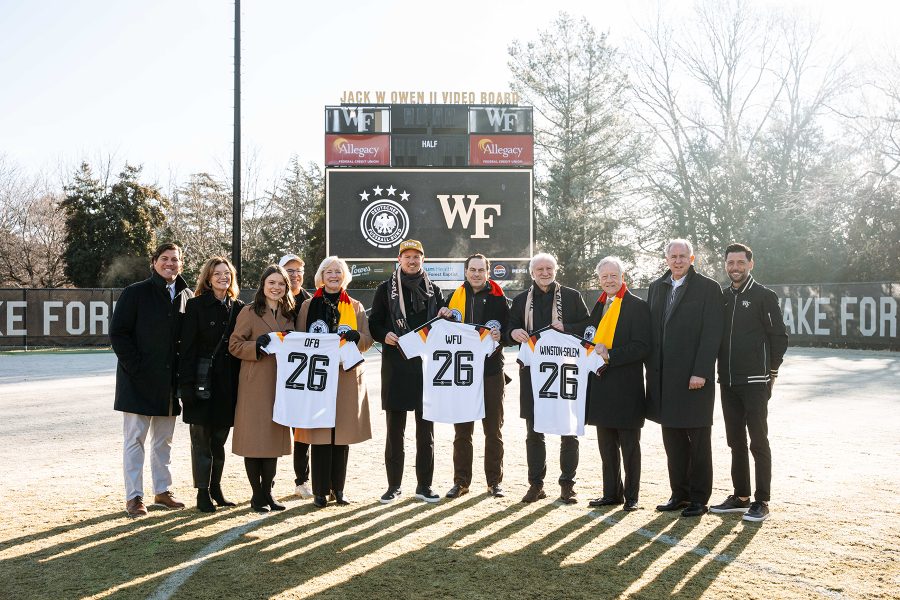Media Advisory: Researcher reacts to Apple announcement
Jed Macosko, associate professor of physics at Wake Forest University and co-creator of BioBook, an interactive replacement for the traditional college-level biology textbook, offers the following comments to Apple’s education announcement this morning. He is available for interviews today 12:30-4:00 p.m. Here is his initial reaction to the news:
“Apple has recognized that learning for students is not a one-way street. Until now, most traditional e-textbooks have focused on linear content delivery, which is not the way people learn. Research shows that we learn by asking questions.
The whole point is to reform the way people use, create and access textbooks. I’m not surprised that Apple is making things as smooth and easy as possible.
The coolest part is iBooks Author. Educators will be able to create more quickly and for free, which lowers costs and improves accessibility for students. Some people might worry that content will become unreliable, but what we’ve seen with Wikipedia is that the cream of the crop typically rises to the top.
It’s interesting to see iTunes U as its own app vs. a component of the iTunes Store. It’s a huge boon for those doing continuing education and audit because you can see so much more than the course itself.
Apple is doing a lot of things right by making the e-text experience more interactive, more engaging, and more searchable. Providing constant content updates through the Cloud is key. Keeping content fresh and current is one of the reasons why we started BioBook – to provide students with the most accurate information without waiting the several-year cycle textbook publishing requires.
One thing BioBook does differently is featuring “near-peer” content authoring – basically creating a giant Wikipedia-like database written by students just beyond the level taught. The benefit is that subjects like biology easier to understand, while the content is approved and managed by Ph.D. level experts.
iBooks Author provides a tremendous opportunity to make BioBook more widely available to students using the iPad. But Apple’s announcement only applies to Apple products – that’s the limitation.”
Background from earlier today:
WFU Researcher Available Today to Demo E-Text Alternative & Talk Apple’s Education Announcement
For reaction to Apple’s much anticipated education announcement, Jed Macosko, a researcher at Wake Forest University who has helped develop a next-generation, electronic learning platform to make non-major sciences courses more manageable, is available to comment on the impact of today’s news on students and educators alike.
An associate professor of physics, Macosko is one of the co-creators of BioBook, an interactive replacement for the traditional college-level biology textbook, which allows for non-linear, question-based learning rather than the traditional static delivery of content we available in textbooks (making learning easier for students with various learning styles).
BioBook was developed by an interdisciplinary team of Wake Forest faculty along with Odigia, a Winston-Salem-based technology company. Initial results from pilots at several Triad institutions, including Wake Forest University, Winston-Salem State University, Salem College, and Guilford Technical Community College, show that students find it easier to understand basic biology concepts, see connections between taught concepts and their own, and track their learning progress. (Recent Mashable article)
BioBook is funded a grant from the Next Generation Learning Challenges program, with support from the Bill & Melinda Gates Foundation and The William and Flora Hewlett Foundation. BioBook is expected to be publicly available for the 2012-2013 school year.
Because switching from rigid, linear textbooks to technology such as iPads alone won’t boost performance, Macosko can:
- Show a demonstration of how BioBook works, including how
- It helps students take in information, using proven how-they-learn research
- It tracks how students use a book, then correlates it to their class success
- It has on-the-fly flexibility, customizable to each instructor and class
- Address the pros and cons Apple’s much-speculated “Garageband for E-Textbooks” software and publishing announcements
- The importance of an open-source (think: Wikipedia monitored by PhDs) model for customizing and updating content
Macosko says he looks forward to what Apple will unveil and adds, “Print textbooks are a dying breed, but most current electronic alternatives aren’t any better at engaging and teaching students effectively. Research has shown that it’s much more effective for students to choose their own adventure, and successful textbooks of the future will do just that.”
Below is additional background information about BioBook. We will also have a student available for interviews.
###
Wake Forest University and Odigia Technology Launch 21st Century Interactive Textbook
Successful learning, engaged students: It’s no longer a textbook case
Switching from rigid, linear textbooks to technology such as iPads, alone won’t boost student performance. Odigia, an educational technology company in Winston-Salem, NC, has partnered with an interdisciplinary team of researchers at Wake Forest University, to turn the classroom upside down, allowing students and instructors to tailor traditional course materials to their own learning style using 21st Century technology.
Through a $249,000 grant from the Next Generation Learning Challenge, the University and Odigia have created BioBook™, an interactive replacement for the traditional college-level biology textbook. This project puts the power of learning into the hands of students, and snatches traditional textbooks right out of their backpacks. The Next Generation Learning Challenge, funded by the Bill & Melinda Gates Foundation and the William and Flora Hewlett Foundation, is part of EDUCAUSE, an organization dedicated to advancing higher education through the use of technology.
BioBook is developed to allow for non-linear, inquiry-based learning rather than relying on the traditional linear, static delivery of content that we expect from textbooks. “This is an opportunity to create a learning environment that adapts to the needs of students and teachers, rather than requiring them to adapt to the environment,” said Joshua Moe, president of Odigia. “Engagement is a powerful leading indicator for student success and we see flexible learning environments as a fantastic opportunity to promote learning engagement.”
BioBook Is Not Just Another eTextbook
“Students don’t read textbooks – study after study has shown that,” said Dan Johnson, a senior lecturer in Biology at Wake Forest University. “And even if a student completes a reading assignment, the text doesn’t promote deep understanding and long-term retention. It facilitates memorization. So why are we still using them?”
BioBook is designed to work for a variety of different learning styles. It also better engages students who have learning difficulties such as dyslexia or other processing disorders, who have long struggled with the traditional lecture-and-reading assignment model. It allows students access to dozens of pieces of information, from text to videos to quizzes to interviews with experts. This variety ensures better understanding and engagement.
The interdisciplinary research team includes Johnson, Associate Professor of Physics, Jed Macosko, and Assistant Professor of Education, Kristin Redington Bennett, working in close collaboration with their strategic technology partner, Odigia. The team has spent the several months building out the BioBook framework; and in-classroom testing of the system to refine materials will be ongoing for two years.
This is a digital tool – but don’t call it an e-textbook. The team has created an ever-evolving learning space customizable for a variety of students. Information is organized into interconnected nodes that contain all of the baseline information a textbook would include, but also supplemental material and self-assessments to enhance the learning experience.
“Take the example of how mitosis works,” Johnson said. “It’s a fundamental piece of knowledge for anyone taking Intro to Biology, but the average student walks out of college still not understanding it because all they’re expected to do is read about it then take a test.”
With BioBook, students have access to “learning nodes” that let them explore mitosis from different directions. Each node includes additional materials that deepen learning.
Basic text is reinforced with multimedia, like a video showing how the cells split; an interview with a molecular biologist who talks about how mitosis goes astray in cancer; or animated images of the cells.
Embedded quizzes assess comprehension of the topic, and a student’s ability to use that knowledge. The system monitors students’ scores as well as overall interaction with the content, so the teacher can monitor progress and suggest help when needed.
Students can ask for help by posting questions to peers or to the teacher. Again, the teacher could review answers given by peers to ensure accuracy.
Students and teachers can write new nodes. In 2010 and 2011, 37 students in one of Macosko’s first-year seminar course used the system – and wrote content for 260 nodes in two semesters.
Macosko said that autonomy kept his students excited about the subject and engaged in learning – a key to success, according to the landmark education study, “How People Learn.” The research says that, to teach students how to understand concepts, courses must accommodate myriad learning styles, should be interactive and should build on previous knowledge, not on arbitrary chapter structures in books.
“Think of a textbook – it’s too long, has lots of text, and gives no chance to check your thinking,” Macosko said. “When you read a textbook, you are not asking the question, ‘Why should I know this?’ It’s our very nature to learn by questioning.”
Initial testing has begun with students taking college biology for non-majors. This school year, students will use BioBook at Wake Forest University, a private four-year university; Salem College, a women’s college; Winston-Salem State University, a historically black state university; and Guilford Technical and Community College, an open-admission two-year community college. BioBook will be publicly available for the 2012-2013 school year.
“It’s exciting to harness the power of technology and analytics to design and develop an effective learning tool that will help students to study better because the possibilities are limitless,” Bennett said. “Though the framework is filled with scientific content now, the concept is applicable to any subject. Just imagine the opportunities for quick, in-the-moment changes to subjects like history or politics. The tools and structure are based on cognitive science, so we know students will respond.”
Additionally, the team is actively looking for curriculum collaborators and subject matter experts interested in providing college- and high school-level content for future initiatives in biology, anatomy and physiology, environmental studies, physics and chemistry. Authors may visit odigia.com for information.
“Our goal is to use technology to create innovative teaching and learning solutions that are easy to use, efficient and cost-effective,” said Moe. “The team at Odigia is always excited to work with partners looking to improve the educational experience.”
###
What makes BioBook so different? The innovations of BioBook are:
- It organizes information based on proven how-people-learn research. Other e-books are arranged in a traditional linear dissemination format. We are training students and teachers to make a simple but profound change, from using statements to questions, which are the foundation of all deep learning. When we tell teachers about it, they all say, “of course. Why have we not been doing this all along?”
- It tracks how students use a book, then correlates it to their class success. This can help identify at-risk students and provide intervention. The infrastructure that is operating out of sight of students in BioBook is amassing an enormous dataset for us. The demographic data, user analytics, and grades reported by instructors will tell us a great deal about the impact certain practices have on outcome, and let instructors intervene before students fail.
- It follows an open source mindset. We expect resources and data to be shared by instructors across institutions. Instructors who do not share information can still use BioBook, but will not get nearly as much value from the data they collect.
- It has on-the-fly flexibility. Who controls the content of the other e-books? Who determines what should be presented? For BioBook, we offer a standard package, but instructors can revise it as needed. We also plan to continuously change and update what is provided based on the data being collected. Also, there can be different versions of the book for each instructor.
- It is integrate into the process of teaching and learning. Where are the assessments and instructor reports on outcomes in other e-books and these other disseminative models?
Categories: Research & Discovery, University Announcements
Media Contact
Wake Forest News
media@wfu.edu
336.758.5237



